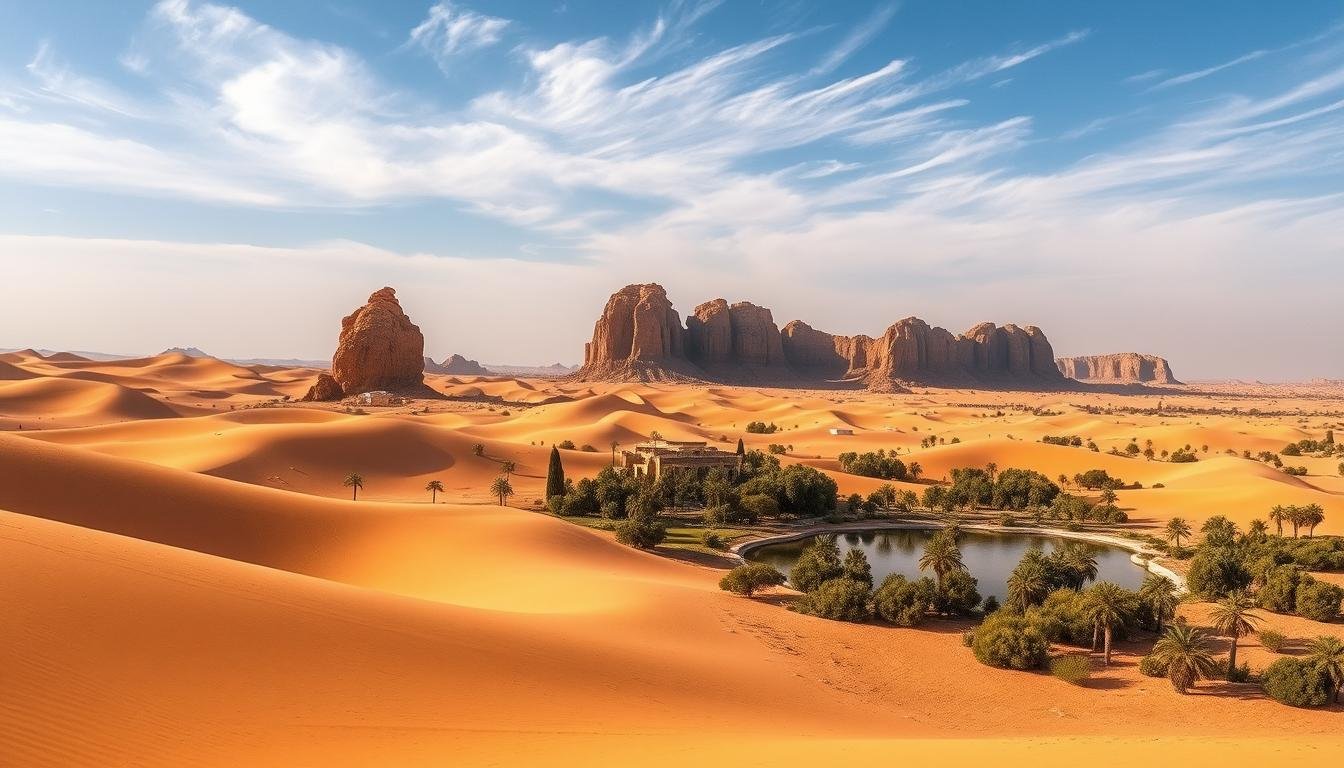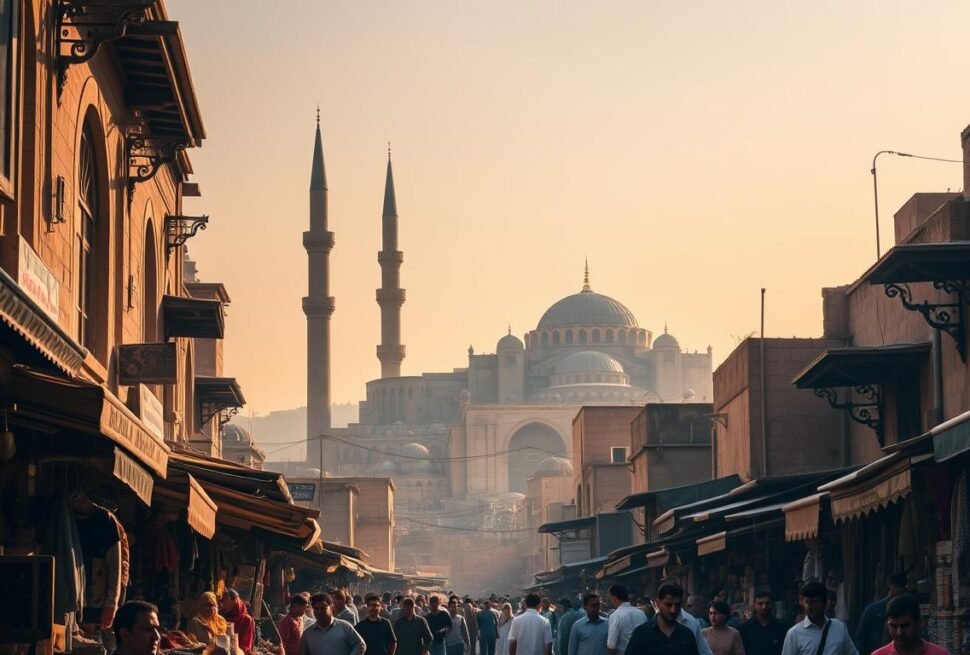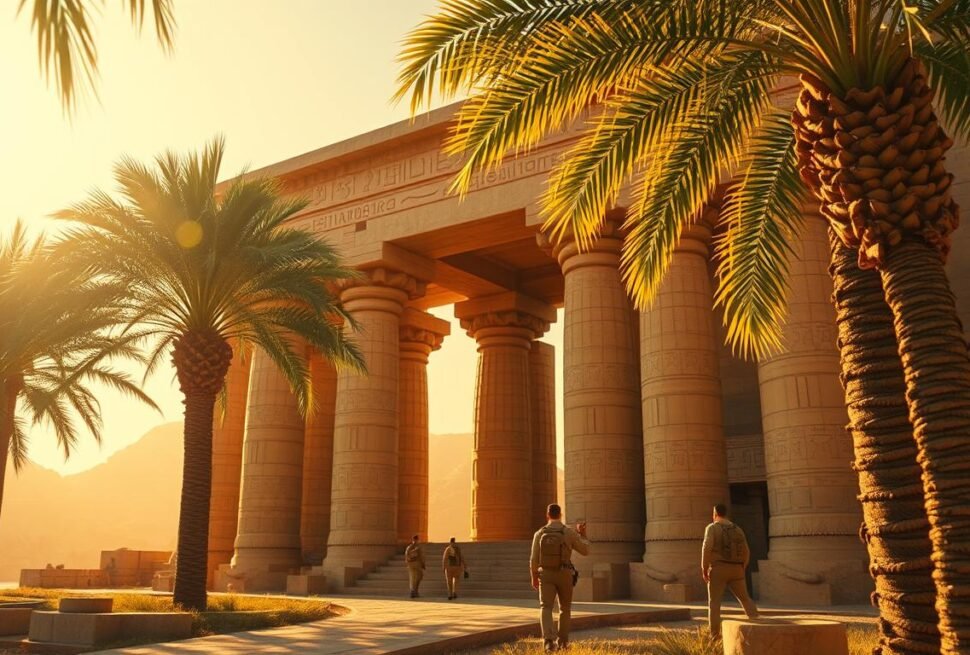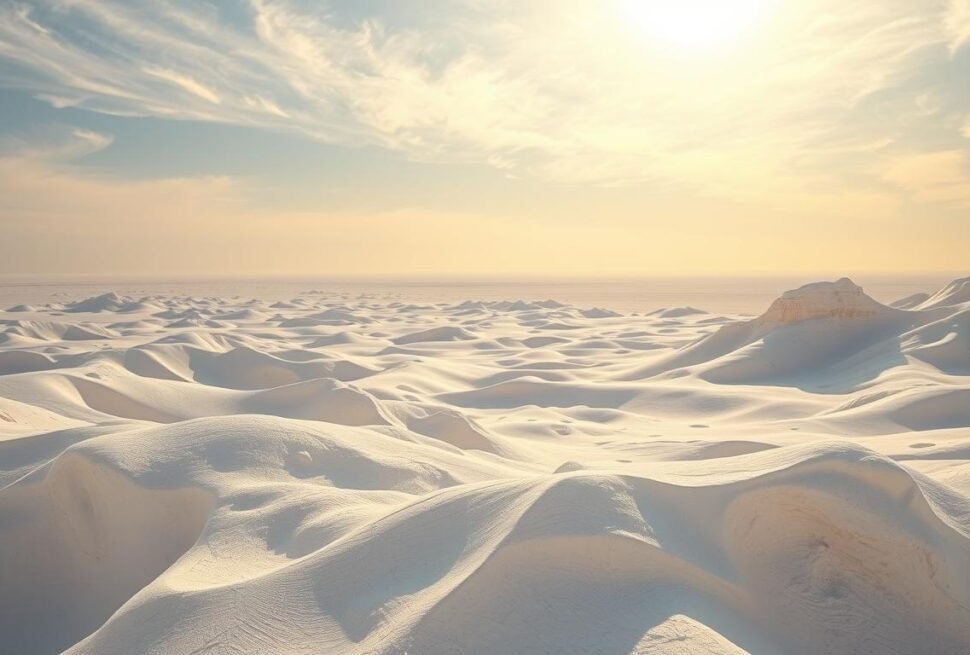What if you could escape to a world where golden sands meet lush palm groves and ancient secrets whisper on the desert breeze?
Nestled near Libya’s border, this remote sanctuary offers more than just stunning views. It provides a genuine escape from crowded tourist spots.
Imagine crystal-clear springs and serene salt lakes surrounded by the Sahara’s endless dunes. This place feels like stepping into another world entirely.
The atmosphere here is perfect for peaceful retreats. You can truly disconnect and find calm away from city noise.
Rich cultural heritage and ancient mysteries make every visit captivating. Each corner tells stories from centuries past.
Ready for an unforgettable journey? Let’s explore what makes this hidden gem so special.
Key Takeaways
- Discover a remote sanctuary with stunning natural beauty
- Experience perfect peace away from crowded tourist areas
- Explore ancient cultural heritage and mysterious history
- Enjoy unique landscapes of palm groves and salt lakes
- Find authentic travel experiences in a cinematic setting
- Plan your personalized visit with trusted local guides
Introduction to Egypt’s Desert Paradise
Far from the beaten path, this remarkable destination combines ancient history with breathtaking natural beauty. It feels like discovering a secret world where traditional life continues amidst modern times.
A Welcome Escape from the Ordinary
Located near the Libyan border, this remote location maintains its unspoiled charm. The journey there feels like stepping back in time to a simpler way of living.
Visitors find perfect peace among thousands of date palms and olive trees. Freshwater springs bubble up from beneath the sand, creating small pools perfect for cooling off.
Serene salt lakes sparkle under the desert sun, creating stunning visual contrasts. The atmosphere encourages complete relaxation and disconnection from daily stresses.
What Makes This Place Unique
The local culture reflects strong Berber influences that have been preserved for centuries. People here speak their own distinct language called Siwi, adding to the area’s special character.
Ancient trade routes once passed through this region, bringing diverse influences. This history created a rich heritage that remains visible today.
Notable sites include the historic Shali Fortress and the famous Oracle Temple. These structures tell stories from different eras of human civilization.
The community welcomes travelers with genuine hospitality and warmth. Local artisans create beautiful jewelry and textiles using traditional methods passed down through generations.
Covering 80 square kilometers at 18 meters below sea level, the area contains over 200 natural water sources. This creates the surreal experience of lush greenery surrounded by endless desert sands.
This hidden gem offers authentic experiences for those seeking natural beauty and cultural depth. It stands as a must-visit destination for meaningful travel experiences.
Why Siwa Oasis Should Be on Your Bucket List
Your travel bucket list deserves a destination that feels both otherworldly and authentically ancient. This remarkable place offers experiences you simply cannot find anywhere else in the world.
From Star Wars to Gladiator: A Cinematic Landscape
The moment you arrive, you’ll recognize scenes from famous films. Golden dunes and unique architecture create a fantasy setting that filmmakers love.
Mud-brick buildings against the desert backdrop instantly remind visitors of Tatooine. Every corner feels like part of a movie set waiting for its close-up.
Shali Fortress stands as a magnificent historical site that channels adventure films. Walking through its ancient ruins feels like stepping into an epic Foreign Legion story.
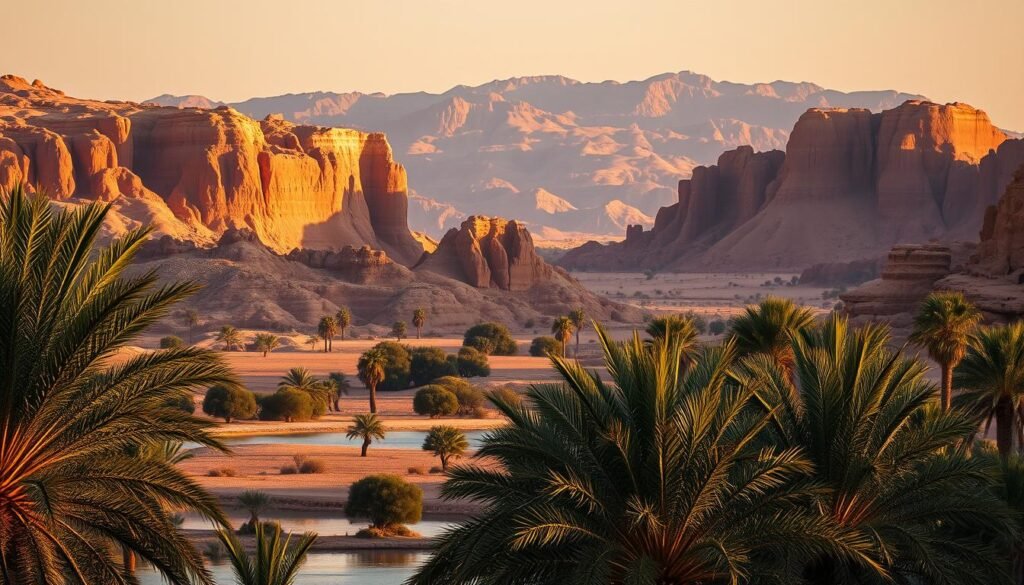
Tranquility and Authenticity in the Western Desert
Peace surrounds you the moment you leave urban noise behind. The Western Desert offers silence so profound you can hear your own heartbeat.
Local culture remains beautifully untouched by mass tourism. People here maintain traditions that have survived for generations.
You can engage directly with community life in a way that feels genuine and respectful. This creates meaningful connections that last long after your visit.
The salt lakes provide incredible floating experiences similar to the Dead Sea. These natural wonders have become Instagram-famous for their surreal beauty.
Evenings bring spectacular stargazing under vast, unpolluted skies. Quiet moments here feel like meditation for the soul.
| Adventure Experiences | Relaxation Opportunities |
|---|---|
| Desert safari tours | Natural hot springs |
| Exploring ancient ruins | Floating in salt lakes |
| Photography expeditions | Palm grove meditation |
| Cultural interactions | Stargazing evenings |
This hidden gem combines excitement and calm perfectly. You can chase adventure by day and find complete peace by night.
Alexander the Great himself journeyed here, adding historical significance to your visit. You’re walking paths that legends once traveled.
Make this extraordinary place part of your travel plans. The experience will leave you with memories that last a lifetime.
A Glimpse into the Rich History of Siwa
History comes alive in this desert sanctuary where ancient stones whisper tales of pharaohs and conquerors. The past feels remarkably present here, connecting visitors to centuries of human experience.
This special place has witnessed incredible moments that shaped world events. Its isolation helped preserve traditions that might have disappeared elsewhere.
The Oracle Temple and Alexander the Great’s Visit
The Temple of Amun, also known as the Oracle Temple, stands as one of history’s most significant sites. For centuries, rulers sought divine guidance from its priests.
In 331 BC, Alexander the Great made his famous journey to consult the oracle. He traveled across dangerous terrain to confirm his divine status.
The temple’s approval helped cement his rule over Egypt. This moment placed this remote location firmly on the historical map.
Today, visitors can walk among the same ruins that once hosted the great conqueror. The atmosphere still carries echoes of ancient mysteries.
The Ancient Shali Fortress: A Story of Resilience
Shali Fortress represents incredible human ingenuity in the heart of the desert. Built in the 13th century, it protected the community for generations.
Local builders used kershef – a mix of mud, salt, and clay – for construction. Palm trees provided reinforcement for the sturdy walls.
This fortress served as the protective center against invasions. Its strategic design kept people safe during turbulent times.
Heavy rains in the 1920s caused partial ruin, but the structure remains impressive. It stands as a cultural landmark showcasing ancient building techniques.
Settlements here date back to ancient times, with the city forming around 1203. Trade routes connecting Egypt with Libya played a vital role in development.
History enthusiasts will find this gem offers endless stories. Every corner reveals another layer of the fascinating past.
The culture here maintains traditions preserved over centuries. Visitors experience living history that continues to evolve while honoring its roots.
Top Attractions: Your Siwa Oasis Adventure Awaits
Your journey through this remarkable destination would not be complete without visiting its most iconic spots. These attractions offer a perfect blend of history, nature, and unique experiences that define the area’s special character.
Each site tells a different story about the people and events that shaped this place. You’ll find yourself constantly amazed by the depth of cultural heritage around every corner.
Exploring the Mysterious Mountain of the Dead
Gebel al-Mawta, also known as the Mountain of the Dead, offers a fascinating glimpse into ancient burial practices. This site features numerous rock-cut tombs dating back to Greco-Roman times.
Visitors can examine well-preserved hieroglyphics and paintings inside the tombs. These artworks provide insights into how people honored their departed loved ones.
The experience feels both educational and slightly eerie in the best possible way. You’re walking through spaces that held great significance for ancient communities.
Taking a Dip in the Legendary Cleopatra’s Spring
Cleopatra’s Spring, locally called Ain Juba, invites you to swim in its mineral-rich waters. Legend says the famous Egyptian queen herself enjoyed bathing here.
The natural pool sits surrounded by beautiful palm trees, creating a peaceful oasis setting. The water’s rejuvenating properties make for a refreshing break during warm days.
This spot perfectly combines historical intrigue with natural relaxation. It’s an experience that engages both body and imagination.
Discovering the Temple of Amun and Umm Ubayd
The Temple of Amun, also known as the Oracle Temple, stands as one of the area’s most significant historical sites. Alexander the Great visited this very place to seek divine guidance.
Nearby, the ruins of Umm Ubayd offer additional exploration opportunities. Both sites showcase impressive ancient architecture against the desert backdrop.
Walking among these stones connects you directly to events that shaped history. The atmosphere carries a palpable sense of the past.
| Attraction | Experience | Practical Info |
|---|---|---|
| Mountain of the Dead | Ancient tomb exploration | 50 EGP entry fee |
| Cleopatra’s Spring | Swimming in historic waters | Free access |
| Temple of Amun | Historical site visiting | 50 EGP entry fee |
| Umm Ubayd Ruins | Additional exploration | Near main temple |
Practical tips for your visit: Wear comfortable walking shoes and bring plenty of water. The sites are within reasonable distance of each other, making a day tour perfectly feasible.
Don’t forget your camera – the photo opportunities are incredible. You’ll want to capture both the ancient details and the stunning natural surroundings.
These attractions form the heart of any visit to this special gem. They provide the perfect way to understand the culture and history that make this place unique.
Make sure to include these iconic sites in your plans. They offer an experience you won’t find anywhere else in the world.
Experiencing Siwan Culture and Traditions
Beyond the stunning landscapes and ancient ruins lies the true heart of this destination—its living culture. The people here maintain traditions that have been passed down through countless generations.
You will find a community deeply connected to its heritage and environment. Their way of life offers a beautiful glimpse into a different pace of existence.
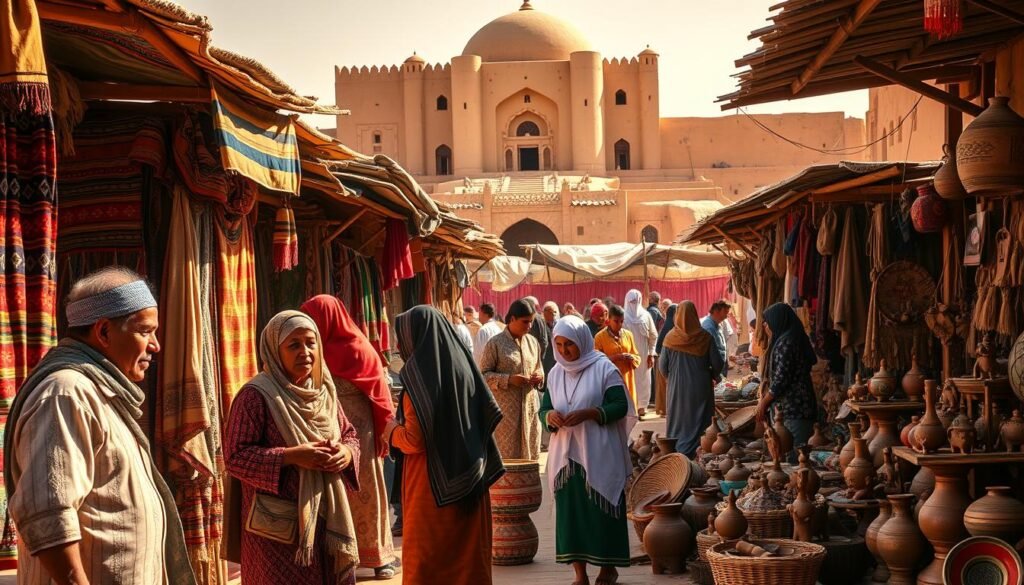
The Unique Heritage of the Siwan People
The local community traces its roots to Berber origins, creating a distinct cultural identity. They speak their own language called Siwi, which adds to the area’s special character.
Hospitality forms the core of social interactions here. Visitors often remark on the genuine warmth and welcoming nature of the people.
Traditional mud-brick architecture reflects practical adaptation to the desert environment. These buildings keep interiors cool during hot days and warm at night.
Daily life moves at a rhythm that feels both timeless and refreshingly simple. You might see women gathering at springs or farmers tending date palms.
Cultural preservation happens through everyday practices rather than museums. From cooking methods to building techniques, traditions remain alive and functional.
Local Crafts and Souvenirs to Look For
Artisans here create beautiful handmade items using skills perfected over centuries. Silver jewelry featuring intricate designs makes for particularly meaningful keepsakes.
Colorful embroidered textiles showcase vibrant patterns and expert craftsmanship. Each piece tells a story through its colors and symbols.
Pottery made from local clay reflects both utility and artistic expression. These functional items often feature traditional shapes and decorations.
Local markets offer wonderful opportunities to support the community directly. You can find fresh dates, olive oil, and other regional products alongside crafts.
The famous tagella bread baked in sand ovens represents culinary tradition at its most authentic. This unique preparation method creates a distinctive flavor and texture.
October brings the Date Harvest Festival with music, dance, and community celebrations. This event showcases the area’s agricultural heritage and social spirit.
Practical tips for cultural immersion: Try local herbal teas, engage respectfully with artisans, and consider participating in available workshops. These interactions create deeper connections and understanding.
Embrace the opportunity to experience this living culture firsthand. It will transform your visit from simple tourism to meaningful human connection.
How to Get to Siwa Oasis: Your Travel Options
Travel options to this unique location provide scenic routes through changing landscapes. The journey itself becomes part of your adventure, offering glimpses of rural life and dramatic desert scenery.
Road travel remains the primary way to reach this remote destination. There are no direct flights or train connections available.
The Journey from Cairo by Bus or Private Tour
From Cairo, the distance covers 560 kilometers through the Western Desert. The trip takes 8-10 hours by bus or private vehicle.
Buses offer an affordable option at around 16 euros per ticket. Daily departures are available, but booking in advance is essential to secure your seat.
The drive transitions dramatically from urban bustle to serene desert landscapes. You’ll watch cityscapes fade into golden dunes and occasional oasis settlements.
Private tours provide more comfort and flexibility for the long journey. Reputable operators ensure comfortable transportation with planned rest stops.
Traveling from Alexandria or Other Egyptian Cities
Alexandria offers a shorter 300-kilometer route taking 6-7 hours by car. This coastal-to-desert journey blends Mediterranean views with arid landscapes.
From Marsa Matruh, the distance is also 300 kilometers with bus connections available. Chartered flights operate occasionally but remain rare options.
Consider breaking up your travel with stops in Alexandria or Marsa Matruh. This makes the journey more enjoyable and lets you experience multiple destinations.
The effort to reach this special place rewards visitors with unforgettable memories. Breathtaking desert views along the way create lasting impressions.
Practical travel tips: Carry plenty of water, wear comfortable clothing, and have local currency for small purchases. The journey forms an integral part of your overall experience.
Today, this remarkable destination remains well worth the travel time required. Your adventure begins the moment you start your journey.
Finding Your Perfect Stay: Siwa Oasis Accommodation
Your journey to this remarkable destination deserves the perfect place to rest. The lodging options here reflect the area’s authentic character and natural beauty.
Charming Eco-Lodges and Traditional Guesthouses
You will find charming eco-lodges and guesthouses instead of luxury hotels. These accommodations feature traditional mud-brick designs that blend beautifully with the environment.
Cozy courtyards and lush gardens create peaceful retreats among palm trees. Many properties sit near natural springs, adding to the serene atmosphere.
What to Expect from Hospitality in Siwa
Local staff provide warm, personalized service that makes visitors feel welcome. They often go above and beyond to ensure a comfortable experience.
You can enjoy delicious local cuisine prepared with fresh ingredients. The hospitality here reflects the genuine culture of the people.
Staying in these accommodations becomes part of your authentic desert experience. It connects you to the heart of this special place.



